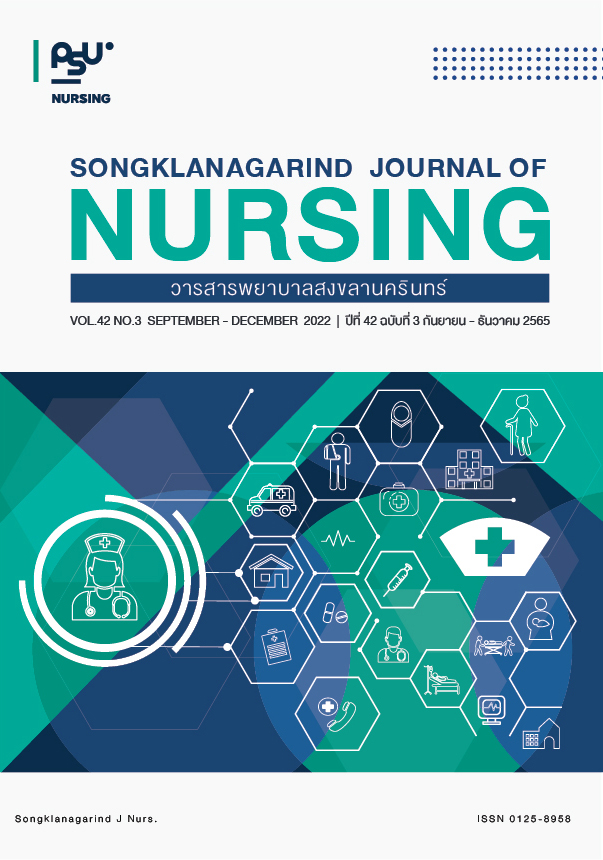ผลลัพธ์การเรียนรู้ตามกรอบมาตรฐานคุณวุฒิระดับอุดมศึกษาแห่งชาติ ตามการรับรู้ของนักศึกษาพยาบาลในการจัดการเรียนรู้ แบบไฮบริด รายวิชาการวิจัยเบื้องต้นทางการพยาบาล
Main Article Content
บทคัดย่อ
วัตถุประสงค์: การวิจัยเชิงบรรยายมีวัตถุประสงค์เพื่อศึกษาการรับรู้ผลลัพธ์การเรียนรู้ตามกรอบมาตรฐานคุณวุฒิระดับอุดมศึกษาแห่งชาติในการจัดการเรียนรู้แบบไฮบริด รายวิชาการวิจัยเบื้องต้นทางการพยาบาลของนักศึกษาพยาบาลมหาวิทยาลัยสงขลานครินทร์ วิธีการ: กลุ่มตัวอย่างเป็นนักศึกษาพยาบาลชั้นปีที่ 4 จำนวน 125 คน คัดเลือกกลุ่มตัวอย่างแบบเฉพาะเจาะจง เก็บข้อมูลโดยใช้แบบสอบถามการรับรู้ผลลัพธ์การเรียนรู้ตามกรอบมาตรฐานคุณวุฒิระดับอุดมศึกษาแห่งชาติ
ผลการวิเคราะห์ความตรงได้ค่าดัชนีความสอดคล้อง เท่ากับ .99 ตรวจสอบความเที่ยงได้ค่าสัมประสิทธิ์อัลฟาของครอนบาค .96 วิเคราะห์ข้อมูลโดยใช้สถิติบรรยาย ผลการศึกษา: การรับรู้ผลลัพธ์การเรียนรู้ตามกรอบมารตรฐานคุณวุฒิระดับอุดมศึกษาในภาพรวมทั้ง 5 ด้าน อยู่ในระดับมาก (M = 4.10, SD = .48) ด้านที่สูงที่สุด คือ ด้านคุณธรรมจริยธรรม (M = 4.28, SD = .49) รองลงมา ด้านทักษะการวิเคราะห์เชิงตัวเลข การสื่อสารและการใช้เทคโนโลยีสารสนเทศ (M = 4.13, SD = .58) ด้านทักษะความสัมพันธ์ระหว่างบุคคลและความรับผิดชอบ (M = 4.12, SD = .56) ด้านความรู้ (M = 4.03, SD = .58) ด้านทักษะทางปัญญา (M = 3.93, SD = .54) สรุป: การจัดการเรียนรู้แบบไฮบริดในรายวิชาการวิจัยเบื้องต้นทางการพยาบาล ส่งผลให้นักศึกษาพยาบาลมีผลลัพธ์การเรียนรู้ตามกรอบมาตรฐานคุณวุฒิระดับอุดมศึกษาแห่งชาติอยู่ในระดับมากผลการศึกษาสามารถใช้เป็นข้อมูลพื้นฐานในการจัดการเรียนการสอนต่อไป
Article Details

อนุญาตภายใต้เงื่อนไข Creative Commons Attribution-NonCommercial-NoDerivatives 4.0 International License.
เอกสารอ้างอิง
The Permanent Secretary Ministry of Education. Development plan of Ministry of Education No.12 (2017-2021) [internet]. 2021 [cited 2021 May 2]. Available from: http://www.reo2.moe.go.th/home/index.php/login/2018-10-30-03-59-47/498-12-2560-2564
Office of the Higher Education Commission, Ministry of Education. Thai Qualifications Framework for Higher Education B.E. 2552 [internet]. 2017 [cited 2021 May 1] Available from: http://www.mua.go.th/users/tqf-hed/
Prajankett O. Transformative learning: Nursing education perspective. JRTAN. 2014; 15(3): 179-84. Thai.
Pangsri S. Project-based instruction: Application to practice in nursing education. JPNC. 2018; 29(1): 215-22. Thai.
Faculty of Nursing, Prince of Songkla University. Baccalaureate curriculum 2016 [internet]. [cited 2021 May 2]. Available from: https://www.nur.psu.ac.th/nur/file_courses/bachelor1_edit06012561_2559.pdf
Ministry of Public Health. Public health practice guideline for epidemic COVID-19 in implementation of Thailand’s emergency decree B.E. 2548 (No.1). 2020. Thai.
Bamrungsetthapong S, Tharnpanya P, Satjaharuthai K. Hybrid learning and the quality improvement of Thailand’s education in the 21st century. Narkbhut NSTRU. 2020; 12(3): 213-24. Thai.
Kazu IY, Yalcin CK. Investigation of the effectiveness of hybrid learning on academic achievement: A meta-analysis study. IJPE. 2022; 18(1): 249-65.
Rodrigoa RT, Platon LH. Hybrid learning for the digital natives: Impacts on academic performance and learning approaches. KJSS. 2022; 43: 201-8
Suphakworakul C, Hoksuvan S, Chompoolong N. A development of instructional system with hybrid learning for undergraduate students at Rajabhat University. JEMMSU. 2017; 23(1): 66-77. Thai.
Chankong W, Kaladee A. Hybrid learning design in statistics and research in health management for graduate students during the COVID-19 outbreak. Public Health Policy and Law Journal. 2022; 8(2): 295-311. Thai.
Tantranont K, Tuanrat W, Kaewthummanukul K. The application of a blended learning approach to an epidemiology course. Nursing Journal. 2018; 45(1): 100-9. Thai.
Rueangsawat S, Saetew P, Choome P. The effect of blended learning management on 21st century learning skills for nursing students, Boromarajonani College of Nursing, SuratThani. JRTAN. 2020; 21(1): 235-44. Thai.
Afzal M, Ali TD, Gilani SA. Perception of nursing students regarding blended learning implementation at university of Lahore, Pakistan. Saudi J Nurs Health Care. 2019; 2(8): 256-61.
Khamanee T. Teaching education: Knowledge for effective learning management. 19 th ed. Bangkok: Chulalongkorn University Press; 2017. Thai.
Yamane T. Statistics: An introductory analysis. 3rd ed. New York: Harper and Row Publications; 1973.
Best JW, Kahn JV. Descriptive data analysis. Research in education, 10th ed. Boston: Pearson Education; 2006.
Prapinpongsakorn S. Application of activity-based blended learning approach in information studies education. Journal of Information Science. 2020; 38(3): 41-64. Thai.
Chaiwongnakkapun C, Wuttijurepan A, Wattana S, et al. Effects of online teaching and learning on learning outcomes according to TQF in nursing students. JNATNO. 2021; 27(2): 15-31. Thai.
Ruayjinda P, Ekbovonwong D. The comparison of attitudes towards online learning via video and live broadcasting of fourth year medical students at medical education center, Surat Thani Hospital. OJED. 2020; 15(2): 1-12. Thai.
Yamsri K. Effectiveness of using the zoom cloud meeting application tutorial in midwifery practicum. Mahasarakham Hospital Journal. 2019; 16(2): 36-42. Thai.
Phetkliang F. Blended learning. Journal of Early Childhood Education Management. 2021; 2(2): 67-79. Thai.
Wayo W, Charoennukul A, Kankaynat C, et al. Online learning under the COVID-19 epidemic: Concepts and applications of teaching and learning management. RHPC9Journal. 2020; 14(34): 285-98. Thai.


